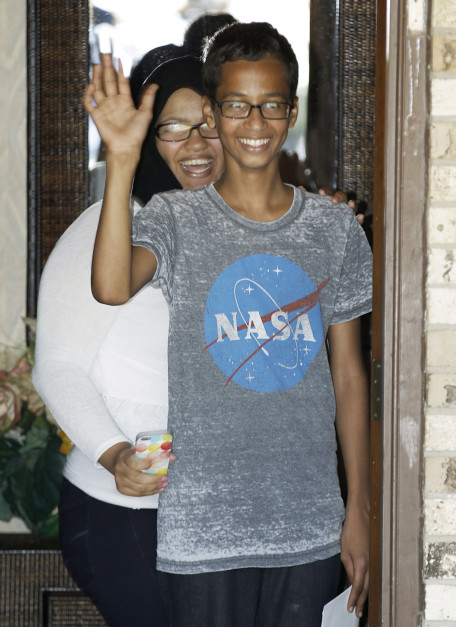
Parents like me send our children to school every weekday morning, entrusting the adults there to educate them and to cultivate, encourage and promote innovation and creativity among them. More importantly, I trust that my children are protected from any harm — not arrested and interrogated without my presence or that of an attorney by law enforcement officers for trying to intellectually impress the very adults we ask them to trust and with whom they spend most of their days.
So as a mother of three public school students and a Muslim, I am outraged that 14-year-old Ahmad Mohammad was removed from his classes, handcuffed, led out in front of his classmates and brought to a juvenile detention centre for building a homemade clock and bringing it to school to show a teacher. I am horrified that officials did not follow protocol by calling his parents or offering him an attorney-demonstrating to me that there is a special justice system set up for Muslims, including Muslim children. And it broke my heart when I read that, after his arrest he said: “It made me feel like I wasn’t human” and “it made me feel like a criminal”. But as much as I am outraged at the treatment this young boy endured, I’m dumbfounded at the ignorance of the adults in his school including the police who literally cannot tell the difference between a clock, a bomb and a “fake bomb”, let alone the kind of child who might bring any of the above.
What message does Ahmad’s treatment by his own teachers send to American Muslim students, aspiring inventors, innovators and engineers? We have spent billions of dollars promoting the math and sciences in schools across the United States — but I guess the people who designed those outreach efforts didn’t mean for Muslim children to take the bait.
The only plausible explanation for a teacher at a school chartered for innovation to respond to a student’s invention with incarceration is that the student was Sudanese American and Muslim, and the teacher, like many Americans, had been saturated with anti-Muslim bigotry and Islamophobia. The irrational response of school officials in Irving, Texas, isn’t limited to one student, one school, one city or even one state. In 2015, anyone can engage in bigotry against Arab Americans and American Muslims and seemingly get away with it. Bigotry against us is acceptable (and sometimes even politically necessary) for elected officials, candidates for public office, pundits and others to advance their careers — or their television ratings.
Muslim children in the United States aren’t sheltered from the vitriol against their faith and communities happening every day. They are on social media, they hear about the armed men protesting in front of mosques, they watch movies reinforcing stereotypes about them, they watch adults running for the president of the US speaking ill of Islam and equating terrorists with Muslims.
I am tired of answering the young people with whom I work — many of whom are Arab American, American Muslims and/or South Asians — when they ask me “Why do they hate us?” “How do we make them like us?” Ahmad reminds me of many of our children — including my own. He is a young, intelligent young man who enjoys inventing and building things. He has a messy bedroom, a Nasa T-shirt, parents who love him and want to teach him the right things. Ahmad and all children of colour deserve to be treated with dignity and respect — and we must demonstrate our belief in their abilities.
America can, as a country, only be as successful as the children it raises to eventually lead us. America has to, as a nation, understand that the hate it allows to go unchecked and the fear it inculcates in the next generation of professionals and leaders causes it great damage and ultimately damages all of us. Every single adult that conspired to criminalise and extinguish the talent and spirit of Ahmad must be held accountable, for him and for the rest of Americans. It should not require a perfect victim — like Ahmad — for us to finally declare that bigotry against an entire faith or community is unacceptable. There are many Ahmad’s watching every move of the adults around them.
Let us not disappoint them again.
— Guardian News & Media Ltd
Linda Sarsour is the national advocacy director for the National Network for Arab American Communities, the executive director of the Arab American Association of New York and lead organiser for The Campaign to Take on Hate.










